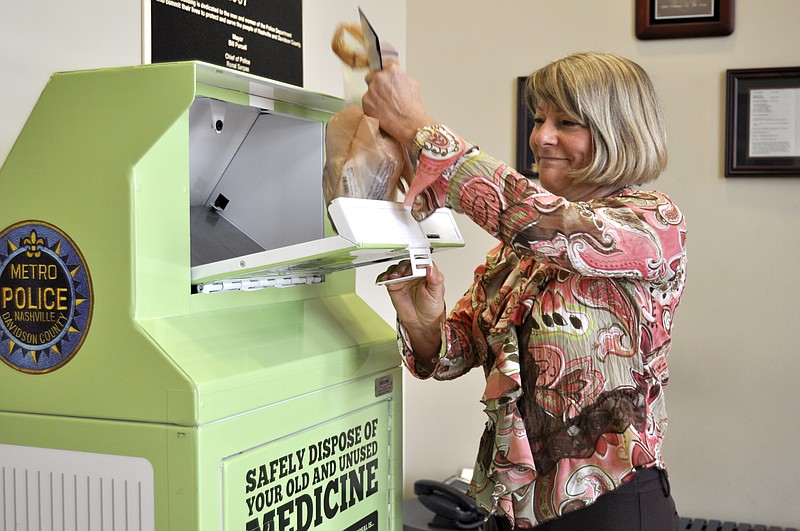Drug take back
More than 80,000 pounds of unused medication were collected in Tennessee in 2017. The counties that collected the most were:› Davidson: 8,004 pounds› Hamilton: 3,726 pounds› Knox: 3,428 pounds› Sumner: 3,245 pounds› Blount: 3,130 poundsSource: Tennessee Department of Environment and Conservation
Tennessee took in a record number of pharmaceuticals in October during National Prescription Drug Take Back Day, a biannual event that combats medication misuse and encourages proper pill disposal.
The national event, sponsored by the U.S. Drug Enforcement Administration in collaboration with state and local partners, collected 912,305 pounds, or about 456 tons, of medicine. Tennessee contributed 29,700 pounds, putting it in the top 10 states with most drugs collected and edging out some much larger states, including North Carolina, Florida and Michigan.
Take Back Day aims to divert potentially dangerous drugs from homes and into secure collection boxes. They then are destroyed in an environmentally safe manner - incinerated at a permitted facility.
"There are a lot of people who just don't know how to dispose of medication or where to take it to, so we wanted to be a part of the effort," said Camilla Bibbs-Lee, director of the Hamilton County Coalition, which helped oversee 14 drop-off locations in the Chattanooga area during October's event. "We want to discourage people from flushing them and allowing the medication to get into the water supply."
Matt Lea, spokesman for the Hamilton County Sheriff's Office, said he's seen an increase in older residents using the service to ensure their leftover medicine doesn't end up in the wrong hands.
"Young people can steal prescription pain medicines from family [or] friends and then resell it on the streets, which causes additional prescription drug abuse," he said.
Kristina Clark, manager of the Count It! Lock It! Drop It! initiative, a community program operated by the Coffee County Anti-Drug Coalition in Manchester, Tenn., that promotes responsible prescription management, said teamwork led to Tennessee's success on Take Back Day.
"It truly is the network of partners that has started all the way from the grassroot-level drug coalitions all the way to the state level," she said.
But there's a darker side to the state's record day.
The rate of prescription opioids, a class of drugs that includes oxycodone, hydrocodone and morphine, circulating throughout Tennessee remains one of the highest in the nation. In 2016, 107.5 opioid prescriptions were written for every 100 Tennesseans. Only Alabama and Arkansas had higher prescribing rates.
The abundance and misuse of prescription opioids has fueled a nationwide epidemic of drug overdose deaths. The medications provide powerful pain relief but can be addictive, cause serious side effects and sometimes lead people to try other, illicit opioids, such as heroin and fentanyl.
Dr. Nita Shumaker, president of the Tennessee Medical Association, said educating the public about opioids' dangers is a critical component of stopping the epidemic.
"Don't share them with people, and get rid of them when you're finished using them - if you've got them sitting around your house, they're a danger to your entire family," Shumaker said.
In addition to Take Back Days, the Tennessee Department of Environment and Conservation provides permanent medication collection boxes at more than 250 locations throughout the state. Tennessee is one of the only states with a collection box in every county, according to a TDEC spokesperson, and the state is constantly adding new boxes.
There also are more than 50 active anti-drug coalitions that help promote and educate citizens about drug abuse and safe medication management.
"There [are] prescriptions in almost every home," Clark said. "It's something that every single person in our community can easily do, not just for your own home, but for other people."
Contact staff writer Elizabeth Fite at efite@timesfreepress.com or 423-757-6673.
